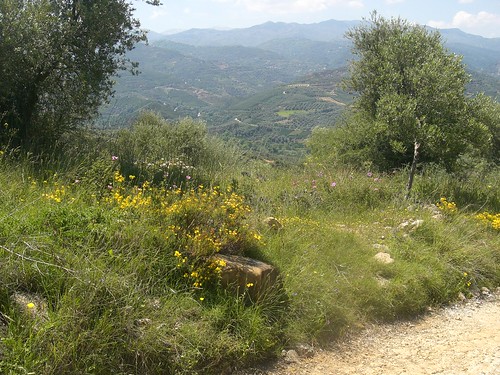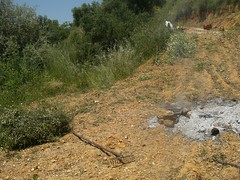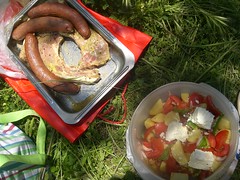Spring spreads a little colour among the evergreen foliage that covers Crete year-round. The wildflowers spray all the colours of the rainbow on the verdant carpet of the fields, even if only temporarily; when the temperatures begin soaring, everything dries up and only the brown stalks will remain. To enjoy the biodiversity of spring time in Crete, you need to seize the moment; what better way than to take your lunch to a field on a sunny day.
Wildflowers in Fournes village
Picnicking in Greece isn't common. In fact, I've never seen anyone lying on the grass, except for foreign migrant workers, who don't have anywhere else to sit and have their coffee when they're doing roadworks or working in fields. And if we didn't have olive groves and orange orchards of our own, we would probably also never go on picnics.

Our picnic spot was our own olive grove with a panoramic view of the village of Fournes, but this was no picnic...
My husband owns an olive grove in the village of Fournes. During spring, he leaves the house early on a Saturday morning to burn off the massive amounts of tree prunings that collect over the year and can't be used as firewood - small branches, twigs, dry leaves and other matter - that are blocking up the pathways leading to the olive trees. These trees were planted on a steep incline at the turn of last century by his great grandparents' family, but were burnt to the ground in a massive fire about 20 years ago. Once the fire broke out, it did not take long for the trees to become completely destroyed; due to its oil content, olive burns rapidly once ignited. Even though the fire was contained quickly, the damage was extensive. The properties that were destroyed were all owned by members of the same extended family.
Amidst his misfortune in suffering a massive drop (at the time) in his annual income from the sale of the olive oil produced from these trees - the field contained 200 productive trees and produced 3 tonnes of olive oil annually - it was also a matter of luck that the fire was NOT caused accidentally by another farmer burning tree cuttings. During a heatwave, a short circuit occurred in the regional electrical grid in the area, causing a fire to break out in some olive groves in the village of Fournes, Hania. This was proven by a long-winding court case, which eventually compensated each owner (ten years later) for the destroyed olive fields, the amount designated by taking into account the value of the field, each tree on the field (my husband had to dig up each and every root to prove that there really was a tree growing there, using even the remnants of black plastic mesh that had somehow escaped the fire's heat) and the amount of annual income losses from the oil produced.
The trees eventually grew back, albeit with one major drawback: their stems were producing wild olives (unift for human consumption). They needed to be pruned back and cleared of all the other foliage, weeds and shrubs that were growing around their roots before they would start producing olives for eating and producing oil. With a heavy heart, my husband began clearing, one-by-one, as many trees as were needed to provide his family with their yearly olive oil needs. Needless to say, this was a monumental task, taking at least ten years to complete; only about a third of the field has been rejuvenated, but that's how much we need to maintain our provisions. It was and still is a traumatic experience whenever he goes to this field; even the mention of this dark period still brings back vivid memories in his mind of the phone call from his cousins ("The village is on fire"), the sight of the hill burning as he approached the village, and the devastating consequences he had to face in the aftermath, as well as the personal grief it caused his family.

Olive groves need a massive amount of maintenance, something very difficult to do if the owner is employed in another sector outside agriculture. The trees need to be pruned, the paths need to be cleared of excess cuttings, and the waste wood that cannot be turned into firewood (we give to relatives who have fireplaces) needs to be burned off. Once the wood has become ashes, it's a pity to waste the perfect setting for a barbecue, even if the ground is covered with thorny plants and sharp rocks. At least the children have finally learnt to walk up and down these hills and have also stopped crying every time they are stung by a thistle...
©All Rights Reserved/Organically cooked. No part of this blog may be reproduced and/or copied by any means without prior consent from Maria Verivaki.












The island extracts a high tithe from those who love her and want to live in her embrace.
ReplyDeleteI'm glad you won your case and happy that the trees are recovering.
Maria, olive trees need a lot of love and attention an it is great that your husband found the energy to do all the pruning! Your bbq looks lovely. I 'd love a bite of that steak.
ReplyDeleteI am constantly amazed by your posts! I am sorry for the devastation to your husband's olive groves and the long, arduous journey just to get it to this point where it can sustain your family's provisions. At the same time, I marvel at how you make use of all that nature provides for your sustenance instead of the supermarket, which is the primary supplier of our needs. I realize that it takes a lot of hard work to cultivate and gather them but the diversity of foodstuff that you've featured makes me wonder what edibles I overlook or discard literally in my own backyard!
ReplyDeleteIt's cool the way you got two purposes out of your fire. It sounds like the olives are a fair bit of work, so I'm impressed you kept it up after such a devastating interruption.
ReplyDeleteSorry to hear about the olive trees but the grove will come around in time.
ReplyDeleteAs for picnics, in the Diaspora the many associations (syllogi) used to hold annual picnics...fond memories.
So sorry about the olive trees, but glad they are coming out of it. The country side is so beautiful!
ReplyDeleteIn time I am sure the olive grove will be what it once was. Kalo kourageio! It seems like a beautiful spot ...
ReplyDeleteMaria,
ReplyDeleteI always envy not only the way you think about your food but also your deep respect for the land and people that produce it. A very nice post.